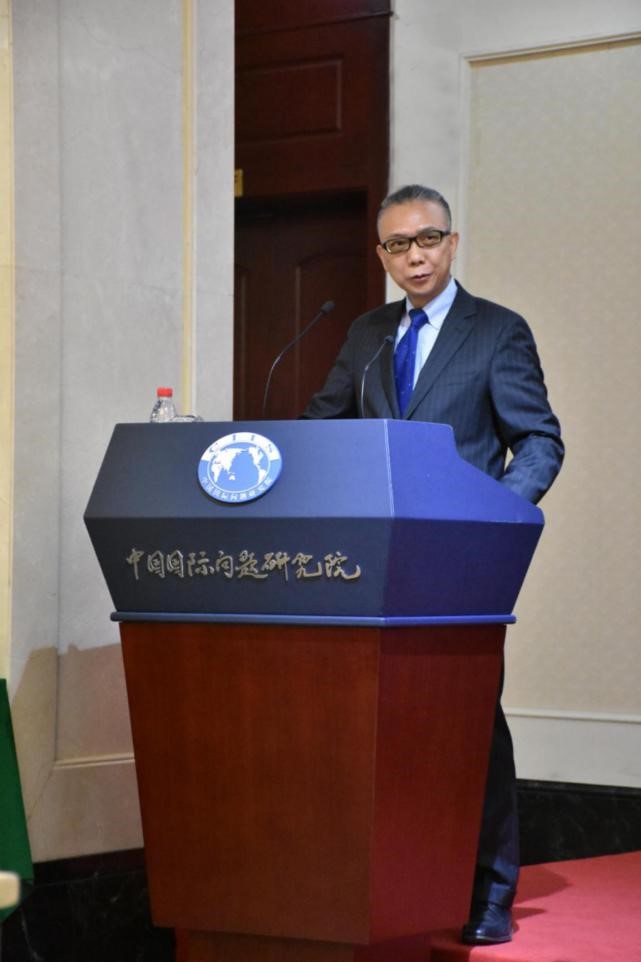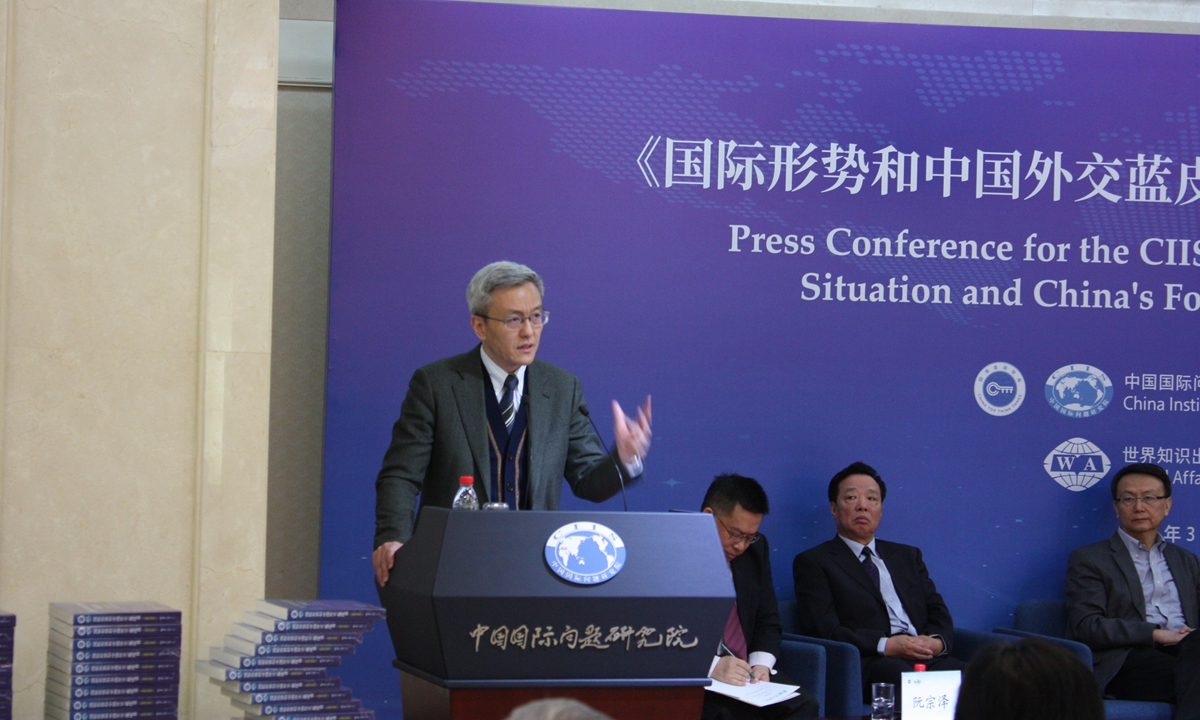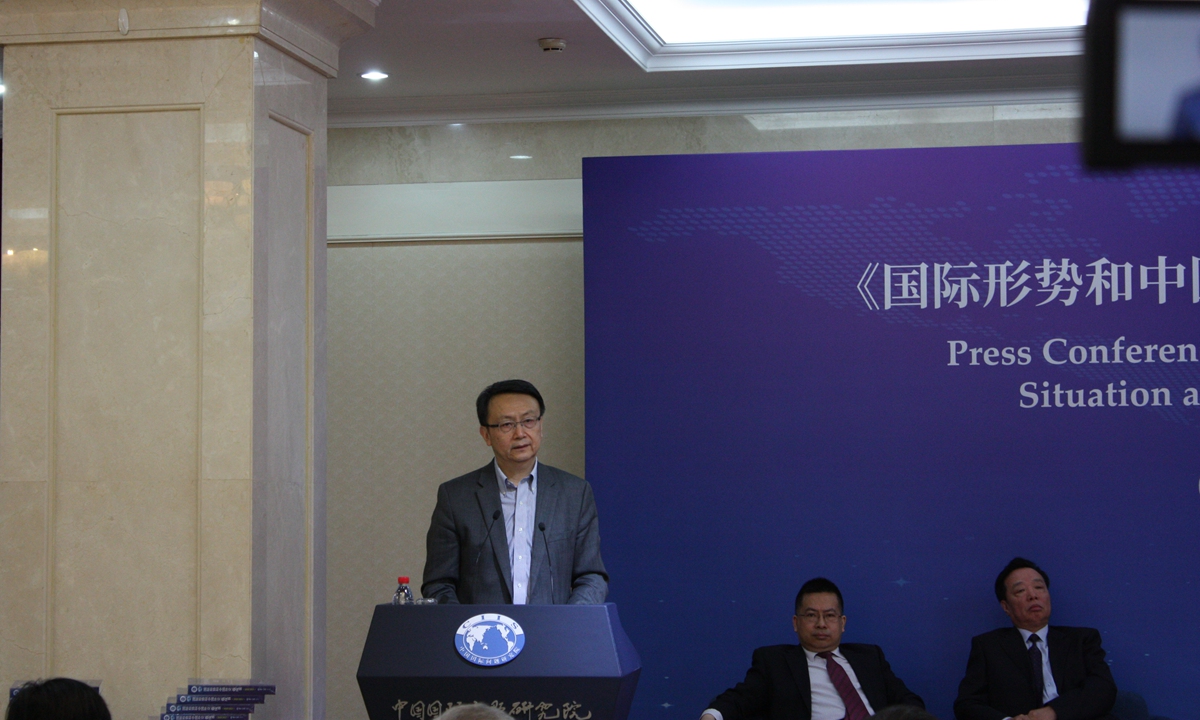Senior Chinese, US officials upcoming meeting in spotlight, both sides need to manage expectation: experts
China-US relations have reached a crucial juncture. The two countries should work together and meet each other halfway, uphold the spirit of nonconflicting, nonconfrontation, mutual respect, and win-win cooperation, said experts attending the launch of the annual blue book on international affairs.
Both countries need to focus on cooperation, manage divergence and promote the healthy and stable development of China-US relations, said Xu Bu, president of China Institute of International Studies (CIIS). He said this at a press conference for the CIIS Blue Book on International Situation and China's Foreign Affairs (2020-21) in Beijing on Friday. The CIIS is a think tank affiliated with China's Ministry of Foreign Affairs.

China-US relations' outlook is one of the key questions during the press conference.
Yang Jiechi, a member of the Political Bureau of the Communist Party of China Central Committee and director of the Office of the Foreign Affairs Commission of the CPC Central Committee, and Wang Yi, State Councilor and Foreign Minister, will join US Secretary of State Antony Blinken and US National Security Advisor Jake Sullivan in Angola from March 18 to 19 for high-level strategic dialogue, said Foreign Ministry spokesperson Zhao Lijian on March 11.

"Both sides will take the chance to explain their concerns, and start from there, to look for a solution," Chen said. After all, it is not realistic to expect to resolve all problems through a single meeting.

Different countries response to the epidemic reflects soft power, the US is not exceptional, Jia said.
For the upcoming meeting, "everyone should not have high expectations. The relationship between the two countries is now very complicated, facing many challenges and problems, and the domestic political atmosphere in the US is also very negative. Under such circumstances, it is truly difficult to achieve particularly substantial progress to reverse the early decline in China-US relations," Jia said.
What President Biden's administration mainly focuses on is getting Congress to approve his official appointments and to pass a $1.9 trillion rescue plan. The China policy is not the Biden administration's current priority. In the US, being tough on China is the main theme, and the Biden administration is unwilling to show softness, Jia noted.
Analyzing the world landscape, Xu said that the world today is undergoing major changes not witnessed in a century, and the novel coronavirus pandemic has had a profound impact on international politics, the global economy, and global governance.
Multipolar continues to develop, and new changes have taken place in the international balance of power, he added.
The US is still the world's largest economic power, but China's momentum continues to accelerate, and the economic aggregates of the two countries continue to level out equally, Xu noted. Meanwhile, relations between major powers are facing new adjustments, and interactive and complex power plays have intensified.
After the Biden administration took over, the relationship between major powers has started a new adjustment process. China-US relations have ushered in a window of opportunity to set things right, he added.
At the same time, regional hotspot issues continue one after another, and traditional and nontraditional security are intertwined and spread. This is not only the development of inherent regional contradictions but also the domestic political, economic, and social changes in some countries caused by the COVID-19 pandemic, as well as unilateralism, bullying, and military intervention, Xu said.
Globally, traditional security and nontraditional security issues have been linked to issues of terrorism, refugee issues, and territorial disputes that have continued to intensify in some regions, Xu said.
As permanent members of the UN Security Council, China and the US bear special responsibilities for world peace and development. The international community is paying close attention to the future of China-US relations, he stressed.
In 2021, the CIIS will closely follow the development of the situation, strive to grasp the major trends, actively carry out exchanges among think tanks, Xu added.
The English and Russian versions of the blue book will be published soon.
Both countries need to focus on cooperation, manage divergence and promote the healthy and stable development of China-US relations, said Xu Bu, president of China Institute of International Studies (CIIS). He said this at a press conference for the CIIS Blue Book on International Situation and China's Foreign Affairs (2020-21) in Beijing on Friday. The CIIS is a think tank affiliated with China's Ministry of Foreign Affairs.

Xu Bu, president of China Institute of International Studies Photo: Courtesy of CIIS
"Cooperation between China and the US will benefit both, while confrontation can only hurt. Both sides should seize historical opportunities, conform to the trend of the times, and commit to jointly safeguarding world peace, stability, and development," Xu said.China-US relations' outlook is one of the key questions during the press conference.
Yang Jiechi, a member of the Political Bureau of the Communist Party of China Central Committee and director of the Office of the Foreign Affairs Commission of the CPC Central Committee, and Wang Yi, State Councilor and Foreign Minister, will join US Secretary of State Antony Blinken and US National Security Advisor Jake Sullivan in Angola from March 18 to 19 for high-level strategic dialogue, said Foreign Ministry spokesperson Zhao Lijian on March 11.

Chen Dongxiao, president of Shanghai Institutes for International Studies Photo: Dong Feng/GT
Chen Dongxiao, president of Shanghai Institutes for International Studies, said that the high-level talk itself is a positive signal, however, "we also need to manage expectations with the outcome.""Both sides will take the chance to explain their concerns, and start from there, to look for a solution," Chen said. After all, it is not realistic to expect to resolve all problems through a single meeting.

Jia Qingguo, a professor of the School of International Studies, Peking University Photo: Dong Feng/GT
Jia Qingguo, a professor of the School of International Studies, Peking University, said that dealing with the impact from the coronavirus pandemic, the US will adjust policies for national security and diplomacy.Different countries response to the epidemic reflects soft power, the US is not exceptional, Jia said.
For the upcoming meeting, "everyone should not have high expectations. The relationship between the two countries is now very complicated, facing many challenges and problems, and the domestic political atmosphere in the US is also very negative. Under such circumstances, it is truly difficult to achieve particularly substantial progress to reverse the early decline in China-US relations," Jia said.
What President Biden's administration mainly focuses on is getting Congress to approve his official appointments and to pass a $1.9 trillion rescue plan. The China policy is not the Biden administration's current priority. In the US, being tough on China is the main theme, and the Biden administration is unwilling to show softness, Jia noted.
Analyzing the world landscape, Xu said that the world today is undergoing major changes not witnessed in a century, and the novel coronavirus pandemic has had a profound impact on international politics, the global economy, and global governance.
Multipolar continues to develop, and new changes have taken place in the international balance of power, he added.
The US is still the world's largest economic power, but China's momentum continues to accelerate, and the economic aggregates of the two countries continue to level out equally, Xu noted. Meanwhile, relations between major powers are facing new adjustments, and interactive and complex power plays have intensified.
After the Biden administration took over, the relationship between major powers has started a new adjustment process. China-US relations have ushered in a window of opportunity to set things right, he added.
At the same time, regional hotspot issues continue one after another, and traditional and nontraditional security are intertwined and spread. This is not only the development of inherent regional contradictions but also the domestic political, economic, and social changes in some countries caused by the COVID-19 pandemic, as well as unilateralism, bullying, and military intervention, Xu said.
Globally, traditional security and nontraditional security issues have been linked to issues of terrorism, refugee issues, and territorial disputes that have continued to intensify in some regions, Xu said.
As permanent members of the UN Security Council, China and the US bear special responsibilities for world peace and development. The international community is paying close attention to the future of China-US relations, he stressed.
In 2021, the CIIS will closely follow the development of the situation, strive to grasp the major trends, actively carry out exchanges among think tanks, Xu added.
The English and Russian versions of the blue book will be published soon.
